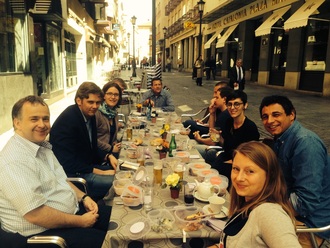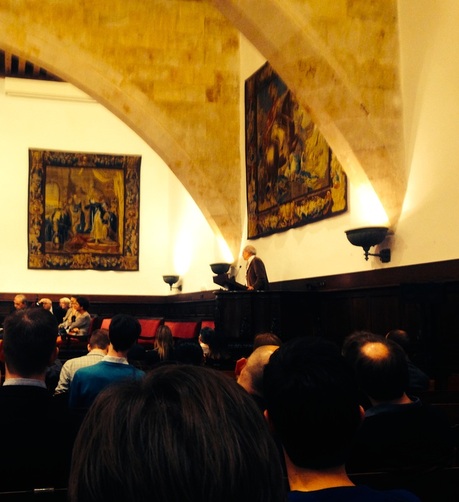
“Researching legitimacy only makes sense if investigated in combination with power or authority”[1]
During April 10th-15th the 2014 ECPR[2] joint Sessions were held in Salamanca, Spain. Host of the Sessions was the University of Salamanca, one of the oldest Universities in the world (established 1218).
I was happy to present my paper: The Impact of Authoritarian Learning on Reforms & the Legitimacy of Contested Regimes at the session on Regime Legitimisation Through Institutional Reform: Analysing its Dimensions and Effectiveness organized by Magnus Feldmann (University of Bristol) and Honarata Mazepus (University of Leiden).
The two convenors selected 20 papers from participants representing universities all across Europe and even as far as Australia. The topics were as manifold as the approaches to the rather broad topic. The overarching aim was to account for the recent re-emergence of legitimacy as a subject of investigation within political science. Reflecting upon the literature common approaches were mapped and categorized. The distinction between normative and empirical assessments of legitimacy and legitimation was the central outcome. Most participants agreed that normative approaches remain important signal posts but do barely wield advantages for assessing legitimacy and legitimation processes in the ‘real word’ due to their subjectivity. We agreed on a need to develop further the empirical approaches to legitimacy with regards to their underlying concepts and operationalization for empirical assessment.
Fundamental typologies of legitimacy and legitimation from Weber, Easton and Schumpeter were intensively discussed in the workshop. Furthermore most of the participants agreed that a focus on the processes of legitimation promises a more fruitful angle to the issue than studying levels of legitimacy at a certain moment in time. A number of papers focussed on legitimation processes in non-democracies –primarily through case studies- whereas others focussed on comparative perspective on legitimacy across the range of rather established OECD democracies.
The format of the Joint Sessions offer truly a great possibility to discuss papers and ideas under a common theme with peers from all over Europe that are working in this field. The fixed workshop belonging generates an intense working atmosphere in which scholars get to know each other and can develop thought together over the course of the 5 days. Despite differences in terms of the positions of the participants the discourse in the workshop was largely ‘Herrschaftsfrei’. Which means that there was no difference being made between me (as a first year PhD student) and distinct Professors amongst the participants.
The collegial atmosphere of the workshop contributed to getting to know each other and enjoying Spanish tapas together after the hard work was done.
All in all I can only recommend the ECP Joint Sessions as a place of scientific deliberation and debate of ones research and ideas. The comprised and intense form of working together across all hierarchical structures is a great chance to receive feedback and comments to your own work, to get a grasp of what scholars within one’s topic of interest are doing, to discuss current state of the art approaches and concepts and finally to get to know other scholars in your field.
[1] Quote form the opening presentation of the convenors
[2] European Consortium for Political Science Research

 RSS Feed
RSS Feed
